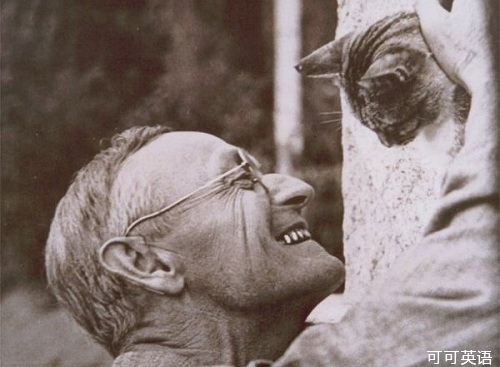(单词翻译:单击)
名著阅读
AWAKENING
When Siddhartha left the grove, where the Buddha, the perfected one, stayed behind, where Govinda stayed behind, then he felt that in this grove his past life also stayed behind and parted from him. He pondered about this sensation, which filled him completely, as he was slowly walking along. He pondered deeply, like diving into a deep water he let himself sink down to the ground of the sensation, down to the place where the causes lie, because to identify the causes, so it seemed to him, is the very essence of thinking, and by this alone sensations turn into realizations and are not lost, but become entities and start to emit like rays of light what is inside of them.
Slowly walking along, Siddhartha pondered. He realized that he was no youth any more, but had turned into a man. He realized that one thing had left him, as a snake is left by its old skin, that one thing no longer existed in him, which had accompanied him throughout his youth and used to be a part of him: the wish to have teachers and to listen to teachings. He had also left the last teacher who had appeared on his path, even him, the highest and wisest teacher, the most holy one, Buddha, he had left him, had to part with him, was not able to accept his teachings.
Slower, he walked along in his thoughts and asked himself: "But what is this, what you have sought to learn from teachings and from teachers, and what they, who have taught you much, were still unable to teach you?" And he found: "It was the self, the purpose and essence of which I sought to learn. It was the self, I wanted to free myself from, which I sought to overcome. But I was not able to overcome it, could only deceive it, could only flee from it, only hide from it. Truly, no thing in this world has kept my thoughts thus busy, as this my very own self, this mystery of me being alive, of me being one and being separated and isolated from all others, of me being Siddhartha! And there is no thing in this world I know less about than about me, about Siddhartha!"
Having been pondering while slowly walking along, he now stopped as these thoughts caught hold of him, and right away another thought sprang forth from these, a new thought, which was: "That I know nothing about myself, that Siddhartha has remained thus alien and unknown to me, stems from one cause, a single cause: I was afraid of myself, I was fleeing from myself! I searched Atman, I searched Brahman, I was willing to to dissect my self and peel off all of its layers, to find the core of all peels in its unknown interior, the Atman, life, the divine part, the ultimate part. But I have lost myself in the process."
Siddhartha opened his eyes and looked around, a smile filled his face and a feeling of awakening from long dreams flowed through him from his head down to his toes. And it was not long before he walked again, walked quickly like a man who knows what he has got to do.
"Oh," he thought, taking a deep breath, "now I would not let Siddhartha escape from me again! No longer, I want to begin my thoughts and my life with Atman and with the suffering of the world. I do not want to kill and dissect myself any longer, to find a secret behind the ruins. Neither Yoga-Veda shall teach me any more, nor Atharva-Veda, nor the ascetics, nor any kind of teachings. I want to learn from myself, want to be my student, want to get to know myself, the secret of Siddhartha."
觉醒
当席特哈尔塔离开活佛以及戈文达所在的林苑时,他觉得自己把以前的生活也留在身后,与之彻底分手了。他慢慢地走着,边走边累索这种充满了他身心的感受。他沉思着,就好像潜过一片深水,让自己沉到这种感觉的底部,一直沉到根由所在之处,因为他觉得思考就能认识到根由,感觉只有这样才能上升为认识,不至于迷途,而是掌握本质,并且开始放射出内在的光彩。
席特哈尔塔边沉思边缓缓地前行。他发觉自己已不再是年轻的小伙子,而是一个成年男子 汉了。他发觉有一样东西已离开了他,就像蛇蜕下了一层老皮似的,有一样东西在他身上已不复存在,而那正是陪伴了他整个青少年时代并一直属于他的东西,那就是拜师求教的愿望。在他的前进道路上出现的最后一个老师,那个最高贵、最聪明的老螬,也就是那位活佛,已经离开了他。他不得不与他分道扬镳,不能再接受他的教诲了。
这个思索者走得更慢了,边走边问自己:“你原来想通过聆听教诲从老师那儿学到的东西到底是什么呢?曾经给过你许多教诲的人却无法教给你的东西又是什么呢?”他认为,“那是自我,我要学的就是自我的意义和本质。我要摆脱和克服的就是自我。但是我没能克服它,只能蒙哄它,只能避开它,只能躲起来。真的,世上万物中只有这个自我让我费尽了心思,也就是这个谜:我活着,我是一个人,与其他所有人都不同,我是席特哈尔塔!我对世上万物了解得远比对我自己、对席特哈尔塔更多!”
这个缓缓前行的思考者停下了脚步,完全陷入这想法之中,接着,从这个想法又冒出了另一个想法,一个新想法,那就是:“我对自己一无所知,对席特哈尔塔极为,陌生,很不了解,其原因只有一个:我害怕自己,回避自己!我寻求阿特曼,我寻求婆罗门,我情愿分割和剥离自我,以便在不为人所知的内心深处找到一切皮肉的内在核心,也就是找到阿特曼,找到生活,找到神性,找到最终的东西,而自我却迷失不见了。”
席特哈尔塔睁开眼睛,环顾四周,脸上露出了笑容,一种从悠悠长梦中醒来的感觉传遍他全身,一直传到了脚趾。他又迈开步子,快跑起来,正如一个知道自己要去做什么的男子汉。
“哦,”他深深地吸了一口气,心想,“现在我不再让席特哈尔塔逃脱我了!我不再以阿特曼和尘世的烦恼来开始我的思考和生活了。我不愿再杀戮和分割自己,以便在残骸后面发现一个秘密了。我不想再学《耶柔吠陀》,不想再学《阿闼婆吠陀》,不想再当苦行僧,也不想再信奉什么学说了。我要向自个儿学,当个小学生,了解我自己,了解席特哈尔塔的秘密。”
背景阅读

本书简介:
古印度贵族青年悉达多英俊聪慧,拥有人们羡慕的一切。为了追求心灵的安宁,他孤身一人展开了求道之旅。他在舍卫城聆听佛陀乔答摩宣讲教义,在繁华的大城中结识了名妓伽摩拉,并成为一名富商。心灵与肉体的享受达到顶峰,却让他对自己厌倦、鄙弃到极点。在与伽摩拉最后一次欢爱之后,他抛弃了自己所有世俗的一切,来到那河边,想结束自己的生命。在那最绝望的一刹那,他突然听到了生命之河永恒的声音……经过几乎一生的追求,悉达多终于体验到万事万物的圆融统一,所有生命的不可摧毁的本性,并最终将自我融入了瞬间的永恒之中。
作者简介:
赫尔曼·黑塞(Hermann Hesse,1877.7.2-1962.8.9)德国作家。1923年46岁入瑞士籍。1946年获诺贝尔文学奖。1962年于瑞士家中去世。爱好音乐与绘画,是一位漂泊、孤独、隐逸的诗人。黑塞的诗有很多充满了浪漫气息,从他的最初诗集《浪漫之歌》的书名,也可以看出他深受德国浪漫主义诗人的影响,以致后来被人称为“德国浪漫派最后的一个骑士”。主要作品有《彼得·卡门青》、《荒原狼》、《东方之行》、《玻璃球游戏》等。
主要生平及创作
出生于德国西南部的小城卡尔夫的一个牧师家庭。自幼在浓重的宗教气氛中长大,1891年,他通过“邦试”,考入毛尔布隆神学校。由于不堪忍受经院教育的摧残,半年后逃离学校。这期间他游历许多城市,从事过多种职业。
在比较广泛地接受东西方文化熏陶之后,1904年,黑塞发表了长篇小说《彼得·卡门青特》,一举成名,从此成为专业作家。这一年他与玛丽结婚,移居巴登湖畔,埋头写作,1906年发表了长篇小说《在轮下》。这一时期的创作以浪漫主义诗歌、田园诗风格的抒情小说和流浪汉小说为主,作品洋溢着对童年和乡土的思念之情,充满对广大自然和人类的爱,同时也表现了青年人的精神苦闷与追求。
第一次世界大战后,黑塞的创作发生了明显的变化,他醉心于尼采哲学,求助于印度佛教和中国的老庄哲学,并对荣格的精神分析产生了深厚的兴趣。他试图从宗教、哲学和心理学方面探索人类精神解放的途径。这时期的长篇小说有《克努尔普》(1916)、《德米安》(1919)、《席特哈尔塔》(1922)、《荒原狼》(1927)和《纳尔齐斯与歌尔德蒙》(1930)等。这些书深受西方读者的喜爱,得到极高的评价,其中《荒原狼》曾轰动欧美,被托马斯·曼誉为德国的《尤利西斯》。
30年代后,法西斯在德国猖獗,黑塞对社会前途陷入深深的怀疑与绝望之中,但他仍不倦地从东西方宗教与哲学中寻求理想世界,《东方之行》(1932)、《玻璃球游戏》(1943)正是这一时期追求与探索的结晶。
黑塞被雨果·巴尔称为德国浪漫派最后一位骑士,这说明他在艺术上深受浪漫主义诗歌的影响。他热爱大自然,厌倦都市文明,作品多采用象征手法,文笔优美细腻;由于受精神分析影响,他的作品着重在精神领域里进行挖掘探索,无畏而诚实地剖析内心,因此他的小说具有心理的深度。1946年,"由于他的富于灵感的作品具有遒劲的气势和洞察力,也为崇高的人道主义理想和高尚风格提供一个范例",黑塞获诺贝尔文学奖。


